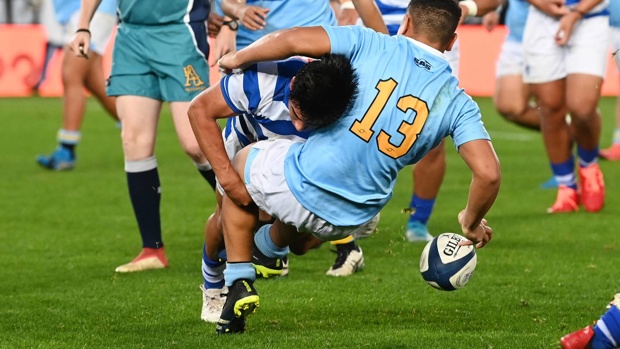"No more jumping" - NZ Rugby introduces experimental law changes
- Publish Date
- Friday, 10 September 2021, 8:42AM

Photosport
By: Christopher Reive
The majority of New Zealand's secondary school rugby players will not be allowed to jump to catch a high ball and will have to aim lower when making a tackle in 2022 as New Zealand Rugby experiments with laws to evolve the game.
Several experimental domestic safety law variations (EDSLVs) were unveiled by NZR on Thursday that will feature in school and club rugby next season. While several focus on scrums, the secondary school players will have a period of adjustment as they come to grips with new rulings in open play.
With the exception of first XV rugby, secondary school players must remain grounded when catching high balls, while all tackles must be made below their opponent's sternum, with both variations made in a bid to improve player safety.
Speaking on why first XV rugby will not have to observe the law variations, NZR general manager of community rugby Steve Lancaster said because these were trials, the organisation did not want to stunt the pathway and development of those on track to go on to the professional game.
"They're experimental and we're mindful that there is a progression through rugby to high levels of the game and while we're trialling some of these new laws, we're also cognisant that we don't want any unintended consequences in terms of how player development may be impacted or otherwise as players progress to higher levels," Lancaster said.
"For the time being, we thought the best thing to do was to trial the secondary school trial at all grades but first XV, but if they're proven successful then in time, we would expect to see those trails extended into other grades and that would potentially apply to first XV as well."
The changes, which were approved by the NZR board in late August, were developed following a series of trials and workshops in 2021, and are part of NZR's ongoing commitment to improving participant's experiences, safety, and the appeal of the game.
Eight of the 15 approved EDSLVs will be rolled out nationally across Small Blacks, teenage and senior grades, with the other seven to be trialled in selected competitions, in consultation with Provincial Unions.
Other law variations include a maximum push of 1.5m at a scrum that is further than 5m out from the try line. There remains no limit on the push of an attacking 5m scrum. At all scrums, the halfback of the team not in possession must remain 1m from the scrum and may not advance past the tunnel until the scrum has ended, and in a bid to avoid reset scrums and speed up the game, a reset scrum following no infringement will result in team originally awarded the scrum being offered an uncontested scrum or free kick.
Lancaster said NZR would receive feedback from control groups in regards to the trials to get an idea of what works and what doesn't as they look to develop the most attractive product possible.
"One of the things we know for a fact is that very few players ever go on to play at the highest level of the game and to play in televised matches," Lancaster said. "We have 160,000-odd players in New Zealand and only a few hundred of those play it professionally. So, for the vast majority of our players, these law trials will be relevant and if they are proven to be successful then they will become embedded throughout the game for all of those community participants.
"We've always been very data driven in rugby and will continue to be so. We'll essentially have control groups where we will collect data from competitions that are played under the existing laws of the game and we will compare that with data that we collect from these trials. But we're also going to put a lot of emphasis on the qualitative feedback that we're able to gauge from out participants.
"Coming back to that participant focus, the data will tell us one part of the story, but what we actually want to know is if these changes make the game more attractive, if they make it more enjoyable to play If they don't that will influence our thinking on their success or otherwise."
This article was first published on nzherald.co.nz and is republished here with permission
Take your Radio, Podcasts and Music with you

